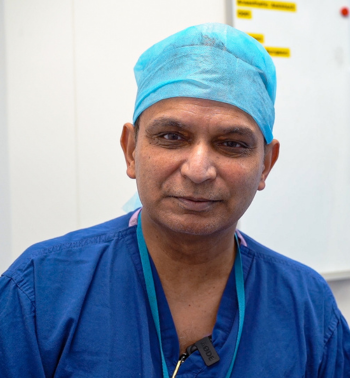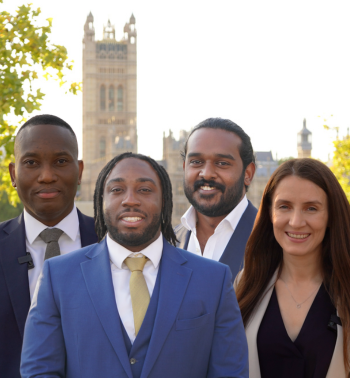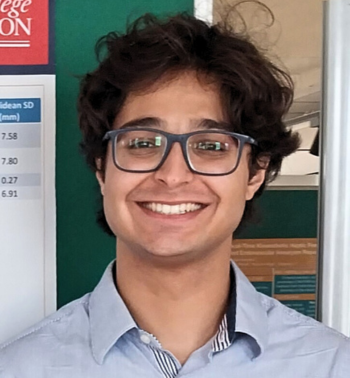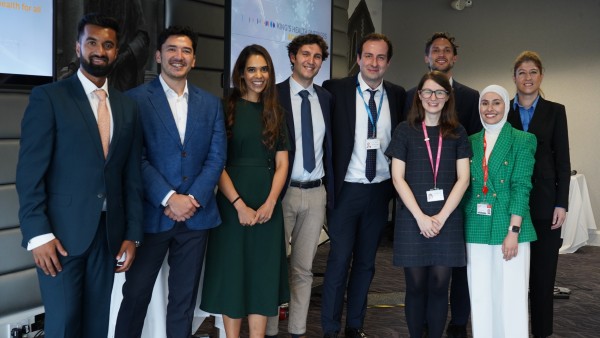Led by Prof Prokar Dasgupta OBE, Professor of Surgery, King's Health Partners Academic Surgery unites the surgical and perioperative community across King's Health Partners, through a series of events and opportunities.
Vision and role
Our mission is to promote surgical excellence by harnessing our partnership’s collective strengths to enhance surgical research for the benefit of patients.
The programme aims to:
- Facilitate outstanding surgical science collaborations;
- Support hybrid surgical and implementation trials;
- Inspire students aspiring to exciting surgical careers;
- Improve education for the next generation of surgical trainees.
"We want to facilitate outstanding surgical science collaborations; support hybrid surgical and implementation trials; improve education for the next generation of surgical trainees; and inspire students wishing to embark on exciting surgical careers."
- Prof Prokar Dasgupta
Areas of focus
Academic Surgery aims to drive surgical excellence across all specialties, improving education, training, access and networks for all of our students and surgeons. Here are some of our key activities:
Our innovative and dynamic lecture series is designed for practising surgeons, undergraduate and postgraduate trainees aspiring to be surgeons, and allied healthcare professionals who support surgical pathways of care. We focus on the latest themes in surgery, providing a framework in which the surgical and perioperative community can come together and network, develop friendships and relationships with national and international colleagues, present high-quality research, and share advancements in their specialist fields.
Celebrating pioneering surgeons through our Grand Round Professorships
As part of our Grand Round series each month, we celebrate equity, diversity and inclusion, and honour two prominent surgeons in history:
- Sir Astley Paston Cooper, a renowned anatomist and surgeon operating in the late 1700s and early 1800s, recognised for his work at Guy’s Hospital which has a Dialysis Unit named after him. He was known in particular for vascular surgery, surgery for hernia, aneurysm, otology and serving as president for the Royal College of Surgeons.
- Margaret Bulkley (Dr James Barry), a famed military surgeon in the same era, operating as Dr James Barry, who performed the first ever recorded and successful caesarean section. Bulkley-Barry was a pioneer both in their professional and personal life, as they lived as a man, but it was in fact discovered upon their death that they were female and had even given birth. We honour Bulkley-Barry as a pioneer.
We have therefore chosen to name this award as the Bulkley-Barry-Cooper Professorship. You can read more about their fascinating life in our guest article by the esteemed author, Jeremy Dronfield.
Grand Rounds 2025
Grand Rounds are typically held virtually on the fourth Thursday of every month, from 5.30pm - 6.30pm. Please note that topics and dates are subject to change.
Details for each Grand Round event are confirmed closer to the time on our events page and below. You can also join our regular invite list to receive the latest event details by contacting kingshealthpartners
Previous Grand Rounds can be accessed via the KHP Learning Hub.
Learn how to innovate, lead responsibly, and navigate change to transform your own clinical practice and leadership.
King’s Health Partners Academic Surgery is offering a full-year executive fellowship programme which aims to teach leadership as the process of implementing positive change in dynamic, volatile or complex environments.
As part of this programme fellows will study six original business school cases and be registered with Harvard Business Impact. This fellowship boasts a faculty with real-world med tech, entrepreneurship, and leadership expertise and offers a flexible course structure to suit full-time clinicians.
The unique programme frames leadership through the perspective of four key domains:
- Risk and crisis management
- Innovation and entrepreneurship
- Diplomacy and people management
- Systems design and Culture creation
Find out more about the Executive Fellowship in Surgical Leadership.
Our Surgical and Interventional Challenges are a series of study days open to all medical and surgical clinicians, interventionalists, undergraduate and postgraduate engineering and medical students, and educators. Co-programmed with the King’s College London Department of Surgical & Interventional Engineering and hosted at the London Institute for Healthcare Engineering, these events aim to:
- Create an interactive environment to share clinical experiences;
- Facilitate balanced debates on current and emerging evidence;
- Provide practical hands-on experience with current devices and techniques used for managing various conditions.
Previous study days have focused on Acute Pulmonary Embolism Management, Stomas, Mesh and Reconstruction in Hernia Repair, Implants in Orthopaedic Surgery, Training in Robotic Surgery, and Gastro-Oesophageal Reflux Disease. For further information and to receive updates on future workshops, visit the King’s College London webpage.
King's Health Partners Academic Surgery facilitates surgical excellence by harnessing our partnership’s collective strengths. This collaborative approach has enabled our colleagues to achieve outstanding results, as evidenced by the 2021 Research Excellence Framework. By working together, we continue to push the boundaries of surgical research, improving patient outcomes and advancing the field of surgery. Below are some of our achievements and ongoing projects.
The IDEAL framework for evaluating surgical robotics
King’s Health Partners colleagues have contributed to an important milestone in the advancement of surgical robotics research through their participation in the Idea, Development, Exploration, Assessment and Long-term monitoring (IDEAL) Robotics Colloquium. The recommendations published in Nature Medicine, provide practical guidance for evaluating surgical robots, structured according to the IDEAL stages, to support the assessment of a surgical robot throughout its life cycle.
Modelling kidney transplants using ex-vivo warm machine perfusion
Researchers successfully modeled antibody-mediated transplant rejection in human kidneys, potentially enabling the investigation of new mechanisms and testing treatment strategies for transplant rejection outside of the human body. The study, published in The Lancet eBioMedicine, was authored by post-doctoral researcher and transplant trainee, Pankaj Chandak and senior authors, Professors Anthony Dorling and Nizam Mamode alongside colleagues in the School of Immunology & Microbial Sciences at King’s College London, Guy’s and St Thomas’ NHS Foundation Trust and King’s Health Partners.
King's Health Partners Academic Surgery has supported a number of pioneering surgical trials over the last few years. Read more below:
- National implementation of a pragmatic quality improvement skills curriculum for urology residents in the UK: Application and results of 'theory-of-change' methodology
“There is global momentum to establish scalable Quality Improvement (QI) skills training curricula. We report development of an implementation plan for national scale-up of the 'Education in Quality Improvement' program (EQUIP) in UK urology residencies.” - Lower gastrointestinal polypectomy competencies in the United Kingdom: A retrospective analysis of Directly Observed Polypectomy Skills (DOPyS)
Polypectomy is often the most hazardous part of colonoscopy. There is significant variability in polypectomy training and assessment internationally. DOPyS (Directly Observed Polypectomy Skills) is a validated assessment tool and is used to demonstrate polypectomy competency in the UK. This study aimed to describe the learning curve for polypectomy competency in UK trainees. - Simulation in Urological Training and Education (SIMULATE): Protocol and curriculum development of the first multicentre international randomized controlled trial assessing the transferability of simulation‐based surgical training
SIMULATE is the first multicentre trial investigating the effect and transferability of supplementary SBT on operating performance and patient outcomes. An evidence‐based training curriculum is presented, developed with expert and trainee input. Participants will be followed and the primary outcome, number of procedures required to proficiency, will be reported alongside key clinical secondary outcomes. - SIMULATE trial shows that simulation-based training offers the surgical profession a clearly improved alternative option to operating on real patients or cadavers.
As training surgeons, our aim is to become good surgeons whilst providing the best possible care to our patients. For the first time, SIMULATE demonstrates that supplementary simulation-based training of surgical trainees results in better performance and less complications, when operating on patients. It also shows twice as many trainees become proficient in complex procedures compared to only training in the operating theatre. Our study provides the evidence-base for surgical specialties to integrate simulation in their training programmes as a means to improve surgical performance, clinical outcomes and patient safety. I’m absolutely delighted that our findings have been accepted in European Urology and I would like to thank The Urology Foundation and all our contributors for helping make this possible. - CMR Surgical (CMR) – a global surgical robotics business – announced Guy’s and St Thomas’ NHS Foundation Trust as the latest NHS Trust, and first site in London, to adopt the Versius robot.
We are delighted that Guy’s and St Thomas’ NHS Foundation Trust and their team of world-class surgeons have chosen to expand their surgical robotics programme with Versius. In designing Versius our goal was to provide a versatile, portable, and cost-effective surgical robotic system that could transform the field of minimal access surgery – allowing more patients to benefit than currently do. The introduction of Versius at the Trust does just that, and crucially at a time when patients, surgeons and hospitals are facing significant health and economic challenges.
Colleagues across King's Health Partners have collaborated with the Old Operating Theatre to develop educational videos to encourage interest in surgery and medicine among young students and the general public.
In the video below, Mr Joydeep Sinha gives an insight into his role as Consultant Orthopaedic Surgeon at King's College Hospital NHS Foundation Trust.
In this video - Prof Prokar Dasgupta, Professor of Surgery, King’s Health Partners, interviews Mr Arun Sahai, Head of Surgery, King's College London School of Medicine. They discuss Mr Sahai's plans for the School, working with the Academic Surgical Grand Rounds, and integrating with medical societies.
Real‑time organ perfusion monitoring of human kidney transplants using ex vivo normothermic perfusion and reflectance spectroscopy. Royal Society Open Science, 12(3), article 242008.
Chandak, P., Bennett, D.P., Phillips, B.L., Uwechue, R., Kessaris, N., Hunt, B.J., Callaghan, C.J., Dorling, A., Hayes, W., Mamode, N. and Day, J.C.C. (2025)
Available at: https://doi.org/10.1098/rsos.242008
Artificial intelligence‑driven streamlining of prostate cancer multidisciplinary team recommendations in a tertiary NHS centre in the UK. BJU International.
Pintus, E., Khattak, A., Ruta, D., Patkar, V., Popert, R., Makanjuola, J., Martin, M., Ledwaba‑Chapman, L., Dodgson, K., Oldroyd, R., Noel, J., Cathcart, P., Hughes, S., Challacombe, B., Josephs, D., Enting, D., McCarthy, R. and Kazmi, M. (2025)
Available at: https://doi.org/10.1111/bju.16845
Real-time organ perfusion monitoring of human kidney transplants using ex vivo normothermic perfusion and reflectance spectroscopy - March 2025.
P. Chandak, D. P. Bennett, B. L. Phillips, R. Uwechue, N. Kessaris, B. J. Hunt, C. J. Callaghan, A. Dorling, W. Hayes, N. Mamode and J. C. C. Day.
Published on the Royal Society Open Science website - read it here.
Academic Surgical Grand Rounds
-
KHP Academic Surgical Grand Round, in collaboration with the King’s Institute for Artificial Intelligence
Event date and time: 26 March 2026, 5:15pm to 7:00pm
Tower Lecture Theatre, Floor 30, Tower Wing, Guy's Hospital
Latest news from KHP Academic Surgery
KHP Academic Surgery leadership
King's Health Partners Academic Surgery will be located at the MedTech Hub and Surgical and Interventional Engineering (SIE) at St Thomas' Hospital. Our team brings together a wealth of experience in surgery, including:
Prof Dasgupta has worked within our partner organisations for more than 20 years. He leads the outstanding robotic surgery programme at King’s College London and fosters strong surgical innovation and research partnerships with NHS partners locally and globally. Read more about Prof Prokar Dasgupta's career.
Prof Ashkan Keyoumars has a specialist interest in functional neurosurgery, image guided surgery and surgery for brain and spinal tumours. In addition to his clinical work, his is actively involved in research, especially in developing novel treatments for brain tumours and for Parkinson's disease. He is the deputy lead for neurosciences Research Advisory Group at King's College Hospital NHS Foundation Trust, the President of the British Society for Stereotactic and Functional Neurosurgery, Chairman of the Surgical Group of the International Parkinson and Movement Disorder Society, and Lead for the Genomics England programme for brain tumours.
Prof Bijan Modarai is the King's College London Chair in Vascular Surgery and a British Heart Foundation (BHF) Senior Clinical Research Fellow. He completed his Basic Surgical Training in London before being awarded a BHF Clinical PhD Studentship in 2002. He graduated with a PhD in Biochemistry in 2006 and completed his Higher Surgical Training as an NIHR Academic Clinical Lecturer at King's College London, and as an Endovascular Fellow at The Royal Prince Alfred Hospital in Sydney. He was appointed as a Senior Lecturer in Vascular Surgery at King's College Hospital NHS FT, and Honorary Consultant Vascular Surgeon at Guy's and St Thomas' NHS FT in 2012, having secured a BHF Intermediate Clinical Research Fellowship.
Mr Joydeep Sinha is a Consultant Orthopaedic Surgeon at King’s College Hospital NHS Foundation Trust, and Honorary Senior Lecturer, King’s College London. He has a specialist interest in Shoulder and Elbow surgery, particularly in the areas of arthroscopic “keyhole” shoulder and elbow surgery, shoulder replacement, sports injuries and upper limb trauma. He is also a Joint Clinical Academic Group Leader within King’s Health Partners, and working to develop and expand the King's Health Partners Department of Academic Surgery.
A journey from surgeon to Chair of KHP
Prof Prokar Dasgupta speaks to The Rt. Hon Prof the Lord Ajay Kakkar PC, the Independent Chair of King's Health Partners.
They discuss Lord Kakkar's reasons for becoming a surgeon, his move into politics, and how he once had eyes on Prof Dasgupta’s role.






